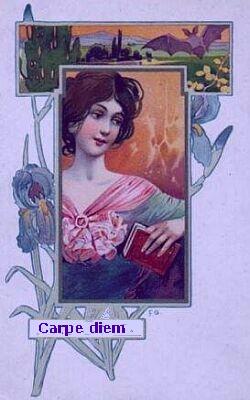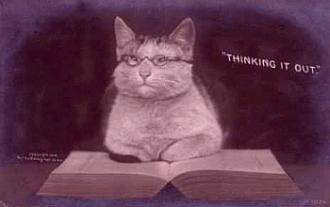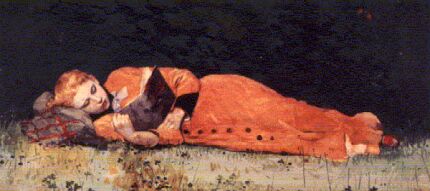«
Calming the Inner Critic and
Getting to Work
»

March 12, 2001
They say writing is lonely work. But that's an exaggeration. Even alone at their desks, writers entertain visitors: characters of a novel, famous and not so famous figures from the past. On good days, all these come to the table. On bad days, however, only unwelcome visitors appear: The specter of the third-grade teacher who despaired of your penmanship. The ghost of the first person who told you that spelling counts. The voice of reason pointing out that what you are about to attempt has already been done — and done far better than you might even hope.

So why bother? Why even begin? It is, after all, abundantly clear that you are not Henry James. Your themes are hackneyed, your style imitative. As for your emotions, memories, insights and invented characters, what makes you think anyone will care? These are the perfectly logical questions of the famous, petty and implacable inner critic.

What should a writer do when the inner critic comes to call? How to silence these disparaging whispers? I have no magic cure, but here, from my own experience, is a modest proposal to combat the fiend.
Forget the past. Nothing stops the creative juices like thoughts of the literary tradition. "You'll never be John Donne!" your inner critic shrieks. Or: " `Middlemarch!' Now that was a book!" These thoughts used to fill me with gloom. Then I went to graduate school at Stanford, and I steeped myself in Shakespeare, Wordsworth and Defoe. The experience set me free.

It happened like this. I was sitting in Green Library trying to write a story, and I looked at all the shelves of books around me, and suddenly the obvious occurred to me. All the great Romantic poets and Elizabethan playwrights and Victorian novelists that tower over me — they're dead! Oh, they still cast their shadow, but I'm alive, and they are irrefutably dead. Their language is exquisite, their scenes divine, but what have these writers done lately? Not a damn thing. Think about it. The idea should give you hope. Past masters are done. Their achievements are finite, known, measurable. Present writers, on the other hand, live in possibility. Your masterpiece could be just around the corner. Genius could befall you at any moment.

"Well," your inner critic counters gloomily, "just remember that when you're gone, your books will suffer the same fate as all the rest. They'll be relics at best. More likely, they'll just languish in obscurity." To which I have to say: So what? I won't be around to care.
Carpe diem. Know your literary tradition, savor it, steal from it, but when you sit down to write, forget about worshiping greatness and fettishizing masterpieces. If your inner critic continues to plague you with invidious comparisons, scream, "Ancestor worship!" and leave the building.

Treat writing as a sacred act. Just as the inner critic loves to dwell on the past, she delights in worrying about the future. "Who would want to read this?" she demands. "Nobody is going to publish a book like that!" Such nagging can incapacitate unpublished writers. Published writers, on the other hand, know that terrible books come out all the time. They anguish: "The reviewers are going to crucify me, and nobody will want to publish me after that."
But take a step back. What are you really afraid of here? When you come down to it, this is just a case of the inner critic masquerading as public opinion, and playing on your vanity.

I know only one way out of this trap, which is to concentrate on your writing itself, for itself. Figuring out what the public wants, or even what the public is: that's the job of pollsters and publicists and advertisers. All those people study the marketplace. But the creative artist can change the world. A true writer opens people's ears and eyes, not merely playing to the public, but changing minds and lives. This is sacred work.

Love your material. Nothing frightens the inner critic more than the writer who loves her work. The writer who is enamored of her material forgets all about censoring herself. She doesn't stop to wonder if her book is any good, or who will publish it, or what people will think. She writes in a trance, losing track of time, hearing only her characters in her head.

This is a state of grace possible only when you are truly desperate to tell a story. Suddenly you are so full of voices, ideas and events that it is as if you were rushing from the scene of the crime. How you arrange your sentences or whether a similar tale has been told before: these could not be farther from your mind. It never occurs to you to question whether your characters are well drawn or whether their dialogue is realistic because all these people are pushing and shoving and talking at once, and to your mind they are real, so realism is not much of a problem.

There is nothing better than listening to your characters regale you. I laughed and shook my head at the things Sharon Spiegelman said and did in "Paradise Park." I was surprised sometimes, as I wrote "Kaaterskill Falls," by the sweetness of Isaac Shulman and the determination of his wife, Elizabeth, and by the calculating, grieving, uncompromising voice of the old Rav Kirshner. They were all fictional characters, and yet in the writing they were real.
Now you may ask, what if my characters won't talk to me? What if they won't even visit? The only answer is to think and think some more, and then go out and read and look and listen some more. Do not sit and mope. Do not sigh. Do not throw up your hands and give up on the whole project. Do not go back to the drawing board. There is nothing more depressing than an empty drawing board. No, go back to the world, which is where all characters originally come from.

Go back to your library, your forest, your newspapers, your family, your day job, your photos, your music, your maps and jottings of old dreams. All these are teeming with life, and life is the stuff of fiction. There are no guarantees, but if you go out where stories congregate, it's far more likely that characters will come.
Recognize that deep down you love your inner critic. How sad, how sordid. How cheap. Secretly writers do love the censor within. We say we hate that sanctimonious inner voice, but there is no better excuse for procrastination, lethargy and despair. There is no better excuse for getting nothing done than to lock yourself in battle with the famous inner demons of self-criticism and doubt.

External obstacles have such obvious, prosaic remedies: time can be found, paper purchased. But when it comes to inner obstacles, the difficulty is spiritual, and thus infinite. "I'm blocked!" you moan. Or, "I'm such a perfectionist, I can never finish." Which is to say your inner critic is blocking the way and too busy pointing out mistakes to let you finish. It's terribly depressing but, admit it, also comforting, to hear that you'll never perfect your work, and thus never finish. If you know you'll never finish, then there is no point in trying any longer. And if you don't try, then you can't fail.

This is a safe situation, but not conducive to creative work. If you want to write, or really to create anything, you have to risk falling on your face. How much easier to sit back and snipe at the efforts of yourself and others. How sophisticated you can become, your own contribution unimpeachable, because it does not exist. Sometimes insightful, always acute, the inner critic can become your closest literary friend, the one who tells you the truth, the one who makes you laugh at yourself and punctures your delusions.
This is all to the good. The danger is in identifying so much with your inner critic that you enjoy self-deprecation more than your work itself. Writer, beware! The inner critic is insidious, subversive, always available for depressive episodes. Stay alert. Know the enemy. Know yourself.

Ultimately every writer must choose between safety and invention; between life as a literary couch potato and imaginative exercise. You must decide which you like better, the perfectionist within or the flawed pages at hand.

Perhaps you'd rather hold yourself to the impossibly high standards of writers long dead. Or perhaps you'd rather not waste time writing something that will go unpublished, unnoticed and unread. You have received no encouragement from anyone else, and so you would never think of encouraging yourself. Or you choose to be a realist. You're smart enough to see your talent is limited, your gift too small to pursue. You can convince yourself of all this, or you can listen to your imagination instead. You can fire yourself up with words and voices. You can look out into the world teeming with stories and cast your net.


Winslow Homer's The New Novel, 1877

Article originally published in the New York Times
© Copyright 2001 The New York Times Company

|
|
|